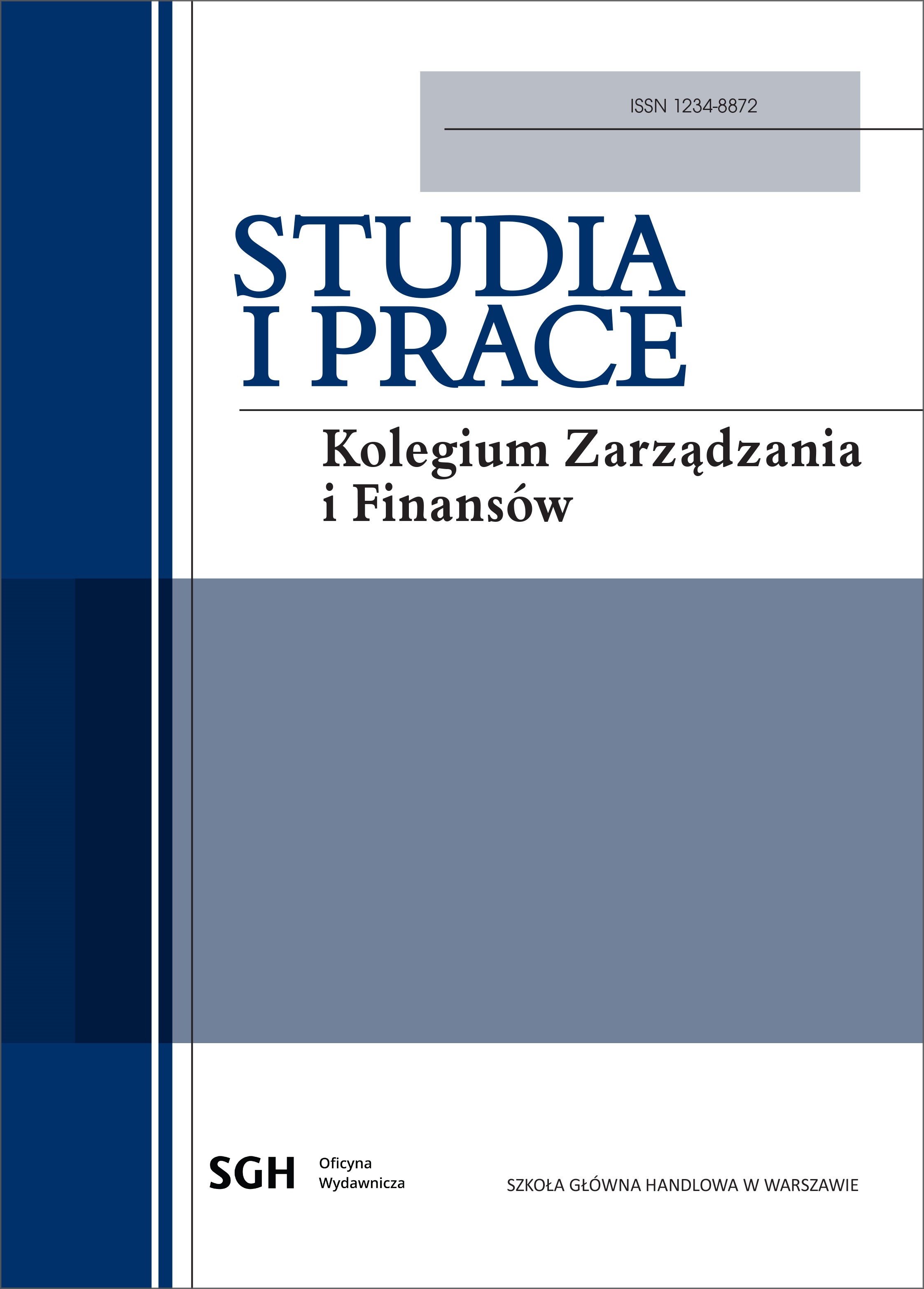Enhanced Attractiveness of Short Food Supply Chains. Pandemic-induced Changes in Customer Behaviour Related to the Purchase of Food
DOI:
https://doi.org/10.33119/SIP.2022.183.6Keywords:
consumer behaviour, pandemic, short supply chain, food, shopping, food origin, hybrid organisationAbstract
The aim of the paper is to answer the research question seeking to find out whether the COVID-19 pandemic has changed Polish consumer behaviour with regard to purchasing domestically produced or foreign food and thus has enhanced the attractiveness of short supply chains. Results of an original study developed by the author to compare consumer behaviour (before, during and after the pandemic) with regard to the frequency of purchasing food produced locally and within a given country and refusing to buy products originating from specific countries were used to answer the question. The study considered variables, such as gender, age, education, domicile, number of people in a household, number of dependent children in the household, and the overall material status of respondents. The results have shown that the pandemic significantly altered consumer behaviour by increasing trust in food produced locally or domestically, and increased the frequency of not buying food originating from specific countries. These results provide foundations for more in-depth studies on the deepening of the attractiveness of short supply chains by, inter alia, hybrid enterprises.
Downloads
References
2. Barry J. [2004], Supply Chain Risk in an Uncertain Global Supply Chain Environment, „International Journal of Physical Distribution & Logistics Management”, vol. 34, no. 9, https://doi.org/10.1108/09600030410567469
3. Battilana J., Lee M. [2014], Advancing Research on Hybrid Organizing – Insights from the Study of Social Enterprises, „Academy of Management Annals”, vol. 8, no. 1, https://doi.org/10.5465/19416520.2014.893615
4. Bublitz M. G., Peracchio L. A., Andreasen A. R., Kees J., Kidwell B., Miller E. G., Motley C. M., Peter P. C., Rajagopal P., Scott M. L. [2013], Promoting Positive Change: Advancing the Food Well-Being Paradigm, „Journal of Business Research”, 66, https://doi.org/10.1016/j.jbusres. 2012.08.014
5. Chambers L., McCrickerd K., Yeomans M. R. [2015], Optimising Foods for Satiety, „Trends in Food Science & Technology”, 41, https://doi.org/10.1016/j.tifs.2014.10.007
6. Chen J., Zhang Y., Zhu S., Liu L. [2021], Does COVID-19 Affect the Behavior of Buying Fresh Food? Evidence from Wuhan, China, „International Journal of Environmental Research and Public Health”, 18, https://doi.org/10.3390/ijerph18094469
7. Corallo A., Latino M. E., Menegoli M., Pizzi R. [2021], Assuring Effectiveness in Consumer-Oriented Traceability; Suggestions for FoodLabel Design, „Agronomy”, 11, https://doi.org/10.3390/agronomy11040613
8. Feldmann C., Hamm U. [2015], Consumers’ Perceptions and Preferences for Local Food: A Review, „Food Quality and Preference”, 40, https://doi.org/10.1016/j.foodqual.2014.09.014
9. Furst T., Connors M., Bisogni C. A., Sobal J., Falk L. W. [1996], Food Choice: A Conceptual Model of the Process, „Appetite”, 26, https://doi.org/10.1006/appe.1996.0019
10. Grabenhorst F., Schulte F. P., Maderwald S., Brand M. [2013], Food Labels Promote Healthy Choices by a Decision Bias in the Amygdala, „NeuroImage”, 74, https://doi.org/10.1016/j.neuroimage.2013.02.012
11. Grunert K. G., Sonntag W. I., Glanz-Chanos V., Forum S. [2018], Consumer Interest in Environmental Impact, Safety, Health and Animal Welfare Aspects of Modern Pig Production: Results of a Cross-National Choice Experiment, „Meat Science”, 137, s. 123–129, https://doi.org/10.1016/j.meatsci.2017.11.022
12. Jager UP., Schroer A. [2014], Integrated Organizational Identity: A Definitionof Hybrid Organizations and a Research Agenda, International Conference ISTR, vol. 25, doi. 10.1007/s11266-013-9386-1
13. Kaya I. H. [2016], Motivation Factors of Consumers’ Food Choice, „Food and Nutrition Sciences”, 7, http://dx.doi.org/10.4236/fns.2016.73016
14. Massey M., O’Cass A., Otahal P. [2018], A Meta-Analytic Study of the Factors Driving the Purchase of Organic Food, „Appetite”, 125, https://doi.org/10.1016/j.appet.2018.02.029
15. Merchant H. [2020], Coronavirus May Stay with us Forever, „The British Medical Journal”, 369, https://pure.hud.ac.uk/en/publications/coronavirus-may-stay-with-us-forever
16. Migliore G., Schifani G., Cembalo L. [2015], Opening the Black Box of Food Quality in the Short Supply Chain: Effects of Conventions of Quality on Consumer Choice, „Food Quality and Preference”, 39, https://doi.org/10.1016/j.foodqual.2014.07.006
17. Ogundijo D. A., Tas A. A., Onarinde B. A. [2021], Exploring the Impact of COVID-19 Pandemic on Eating and Purchasing Behaviours of People Living in England, „Nutrients”, 13, https://doi.org/10.3390/nu13051499
18. Palayew A., Norgaard O., Safreed-Harmon K. [2020], Pandemic Publishing Poses a New COVID-19 Challenge, „Nature Human Behaviour”, 4, https://doi.org/10.1038/s41562-020-0911-0
19. Park K. H., Kim A. R., Yang M. A., Lim S. J., Park J. H. [2021], Impact of the COVID-19 Pandemic on the Lifestyle, Mental Health, and Quality of Life of Adults in South Korea, „PLOS ONE”, 16 (2), https://doi.org/10.1371/journal.pone.0247970
20. Raftowicz M., Kalisiak-Mędelska M., Struś M. [2020], Redefining the Supply Chain Model on the Milicz Carp Market, „Sustainability”, 12, https://doi.org/10.3390/su12072934
21. Raport KPMG w Polsce [2020], Nowa rzeczywistość: konsument w dobie COVID-19. Jak zmieniły się zwyczaje zakupowe Polaków w czasie koronawirusa?, https://home.kpmg/pl/pl/home/insights/2020/09/raport-nowa-rzeczywistosc-konsument-w-dobie-covid-19‑jak-zmienily-sie-zwyczaje-zakupowe-polakow-w-czasie-koronawirusa.html
22. Schmidhuber J., Pound J., Qiao B. [2020], COVID-19: Channels of Transmission to Food and Agriculture FAO, https://www.fao.org/documents/card/en/c/ca8430en/
23. Schmitt V. G. H., Cequea M. M., Vásquez Neyra J. M., Ferasso M. [2021], Consumption Behavior and Residential Food Waste during the COVID-19 Pandemic Outbreak in Brazil, „Sustainability”, 13, https://doi.org/10.3390/su13073702
24. Schröder M. J. A., Mceachern M. G. [2004], Consumer Value Conflicts Surrounding Ethical Food Purchase Decisions: A Focus on Animal Welfare, „International Journal of Consumer Studies”, 28, https://doi.org/10.1111/j.1470-6431.2003.00357.x
25. Thøgersen J. [2009], Consumer Decision-Making with Regard to Organic Food Products, w: Traditional Food Production and Rural Sustainable Development: A European Challenge, red. T.de Noronha Vaz, J. L. R. Peter Nijkamp, Ashgate, Franham.









